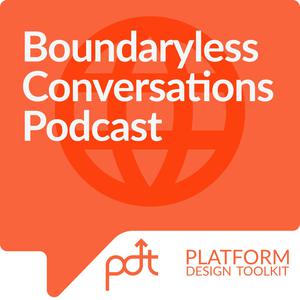
Boundaryless Conversations Podcast
boundaryless
- 49 minutes 54 seconds#112 - Finding the Beauty in Business with Tim Leberecht
In a world of interconnected complexities, where futures can often feel bleak, there’s Tim Leberecht, founder of House of Beautiful Business, integrating beauty where we least expect it - business.
In this episode, he shares how beauty goes beyond aesthetics and speaks to truth, alignment, and the reminder of what humanity is capable of at its best.
Tim highlights the tension many organizations face: on the one hand, movements pushing for visionary changes in value creation, like regenerative economics, participatory design, and co-ops; and on the other, reverting to short-term pragmatism, cutting programs such as DEI initiatives - and, how all of this is inherently a political stance that the organization is taking.
This conversation covers multiple themes - how organizations can avoid homogenization, especially at the time of AI; poly-opportunities to tackle the poly-crisis, decentralizing power, and much more.
As the author of “The Business Romantic”, Tim has always encouraged businesses to actively design spaces for imagination, emotional connection, and alternative ways of thinking.
He explores the importance of fostering rituals like storytelling and resonance inside organizations that can serve as cultural anchors and inspire collective meaning.
Taking the example of how energy, mindfulness, and spirituality are now taking center stage in organizations, he states how often, qualities that are hard to quantify can lead to creating a holistic impact.
He further advocates for businesses to use technology intentionally for optimization while ring-fencing spaces for human creativity, cultural diversity, and the exploration of “what cannot be measured.”
This episode is not one to miss, as Tim explores what it means to be hopeful about the future, where we look beyond binaries. Key Highlights 👉 Beauty in business is not just aesthetic but a way to reconnect with truth, humanity, and the best of what we are capable of, especially in times of crisis and uncertainty. 👉 Organizations must move beyond binary thinking, embracing ambiguity, complexity, and decentralized systems to thrive in a rapidly changing world. 👉 The poly-crisis we face demands a shift toward poly-opportunity—amplifying positive, interconnected forces like regenerative leadership, planetary citizenship, and emotional diversity. 👉 Businesses are inherently political as they shape relationships, value creation, and labor organization; denying this limits their potential to foster meaningful change. 👉 Technology, especially AI, risks driving homogenization and transactional relationships, but businesses must protect spaces for diverse human creativity and imagination. 👉 Feminist philosophy offers a path for businesses to operate in alignment with life, focusing on seasonality, ambiguity, and resistance to systems of control and violence. 👉 Rituals, storytelling, and emotional experiences are essential tools for building resonance, fostering cultural transformation, and generating hope within organizations.
Topics /chapters 00:00 Finding the Beauty in Business 00:57 Introducing Tim Leberecht 09:47 How can Organizations enact positive change? 18:06 Imbibing a “Beauty in Business” mindset 24:32 Bringing Diversity in Homogenized Research 29:24 Feminism and the Complexity Mindset 37:03 Building Organizations that Decentralize Power 40:43 Poly-Opportunity to tackle the Poly-crisis 44:42 Closing Thoughts and Breadcrumbs
Remember that you can always find transcripts and key highlights of the episode on our website: https://www.boundaryless.io/podcast/leberecht-tim
Episode recorded on Dec 03, 2024
Find out more about the show and the research at Boundaryless at boundaryless.io/resources/podcast
Get in touch with Boundaryless:
Twitter: twitter.com/boundaryless_ Website: boundaryless.io/contacts LinkedIn: www.linkedin.com/company/boundaryless-pdt-3eo
Music Music from Liosound / Walter Mobilio. Find his portfolio here: blss.io/Podcast-Music
7 January 2025, 12:00 am - 1 hour 5 minutes#111 - The Power of Making and Remaking with Immy Kaur
A visionary community leader and co-founder of Civic Square, Immy Kaur, joins us on this episode, to drive home some ground breaking thoughts on systemic transformation in our everyday living.
With deep insights drawn from over a decade of experience, Immy challenges conventional thinking about organizing at scale and highlights the urgent need to reimagine how we live, work, and relate to one another.
Touching on the power of unlearning assumptions about systems and authority, she simplifies it for us stating, "we as people build our systems and processes, and to change them, we don’t need permission."
Known for her ability to connect systemic thinking with tangible, participatory action, Immy Kaur helps us visualize how neighborhoods are a strategic site for change—"big enough and small enough" to demonstrate value creation, while fostering agency in communities.
In this episode, she explores critical themes like the fragility of existing systems, and why outdated economic models require a shift. Drawing from frameworks like Doughnut Economics, she unpacks how local, modular prototypes can demonstrate pathways toward systemic change.
She takes us through rethinking value and metrics beyond financial systems, prototyping of modular solutions to tackle systemic lock-ins and so much more.
Tune in and discover how we can reimagine everything through participatory systems to navigate the complex challenges of our times.
Key Highlights
👉 Neighborhoods are strategic sites for change as they are small enough to demonstrate deep systemic transformation while being large enough to inspire scalable solutions.
👉 Unlearning systems is the first step to fostering collective agency and unlocking new possibilities for civic innovation.
👉 Effective transformation requires balancing systemic redesign, practical action, and radical imagination.
👉 Material scarcity and ecological limits become opportunities for creativity, pushing us to innovate within planetary boundaries.
👉 Organizations and communities must rethink value, moving beyond financial metrics to embrace multi-capital approaches that prioritize social, environmental, and care-based economies.
👉 Genuine change involves shifting agency to communities, empowering them to co-lead their transitions and transformations.
👉 Modular, tangible prototypes can demonstrate what systemic alternatives look like, enabling practical steps toward change while inspiring imagination.
Topics /chapters
(00:00) The Power of Making and Remaking - intro
(00:49) Immy Kaur’s introduction
(02:03) Immy Kaur’s Journey and Building Civic Square
(21:23) What defines a civic body?
(32:18) New frameworks, metrics, and institutional forms for creating value
(47:19) New Upcoming Collaborations and Institutional Agreements
(57:32) Breadcrumbs and Suggestions
Remember that you can always find transcripts and key highlights of the episode on our website: https://www.boundaryless.io/podcast/kaur-immy
Episode recorded on Nov 12, 2024 Find out more about the show and the research at Boundaryless at boundaryless.io/resources/podcast Get in touch with Boundaryless: Twitter: twitter.com/boundaryless_ Website: boundaryless.io/contacts LinkedIn: www.linkedin.com/company/boundaryless-pdt-3eo Music Music from Liosound / Walter Mobilio. Find his portfolio here: blss.io/Podcast-Music
24 December 2024, 12:00 am - 56 minutes 24 seconds#110 - Decisions, Not Data: Why Research needs Organizational Readiness with Erika Hall
One of the most revered names in research and design, Erika Hall, Co-founder of Mule Design, joins us on this podcast to challenge the role of research as we know it.
In this episode, she shares deep insights into the challenges of navigating research in complexity, and, on the backbone of systems thinking, offers thought-provoking perspectives addressing the growing tensions between investor-driven narratives and evidence-based practices.
She brings forth some hard truths on how organizations cherry-pick data to justify decisions; and uses this to help us understand why a genuine research mindset is one where you’re comfortable being proven wrong.
This conversation is a powerful reminder that organizations need to embrace curiosity, to stay grounded and relevant. As the author of ‘Just Enough Research’, Erika, has been a revered design consultant, specializing in asking the hard questions to find the right answers.
She takes this episode to show that speed does not equate to better decision-making, emphasizing the need for organizations to focus on thoughtful alignment and genuine learning.
She explores themes such as the performative nature of modern business practices, the disconnect between financial storytelling and real-world impact, the difference between delegation and democratization, and how organizations can navigate all this in an interconnected ecosystem.
Tune in and learn how to ask the right questions and build an organization that’s based on evidence. Key Highlights
👉 Organizations need to embrace research as an anti-authoritarian practice that fosters curiosity and challenges assumptions.
👉 Speed in decision-making is often performative. Slower, thoughtful preparation can lead to better outcomes and long-term agility.
👉 Modularity and decentralization in organizations require clarity in decision-making and alignment. Delegation of tasks is not the same as true democratization of power.
👉 Financial narratives often drive organizational behaviors, leading to misaligned incentives and decision-making that prioritizes appearances over reality.
👉 Systems thinking and psychological safety are crucial for fostering functional, adaptive teams that can navigate complexity and uncertainty effectively.
👉 Organizations should prioritize incremental improvements and long-term value creation over chasing trends and disruptive innovation for its own sake.
Topics /chapters
(00:00) Decisions, Not Data: Why Research needs Organizational Readiness - intro
(00:43) Introducing Erika
(01:50) Evolution of Research
(08:06) Impact of Portfolios, Modularity, and Ecosystemic Approach on Research
(13:04) Organizational Structure, Coherence, and Control
(18:39) The right approach for building capabilities
(26:06) Pillars of designing a research-backed organization
(32:05) Functioning in complexity with coherence
(42:47) Researching an Ecosystem of Interactions
(49:38) Synthetic User Interviews
(53:31) Breadcrumbs and Suggestions
Remember that you can always find transcripts and key highlights of the episode on our website: https://www.boundaryless.io/podcast/hall-erika
Episode recorded on Nov 22, 2024
Find out more about the show and the research at Boundaryless at https://boundaryless.io/resources/podcast Get in touch with Boundaryless: Twitter: https://twitter.com/boundaryless_ Website: https://boundaryless.io/contacts LinkedIn: https://www.linkedin.com/company/boundaryless-pdt-3eo Music Music from Liosound / Walter Mobilio. Find his portfolio here: https://blss.io/Podcast-Music
10 December 2024, 12:00 am - 51 minutes 32 seconds#109 - Beyond Existing Business Model Frames with Jen van der Meer
A popular practitioner of the systemic approach to business, Jennifer van der Meer, founder of Reason Street, joins us on this episode to explore the intersection of business models, capital structures, and ecosystemic value creation. Highlighting how “in business, the challenge is to move beyond the constraints of financial logic and design for broader, systemic impacts that prioritize the health of ecosystems, communities, and bioregions,” Jen challenges to think beyond the existing frames.
While tracing the evolution of business models through distinct eras, she reiterates her belief that business modeling is a creative process where new narratives need to be created that redefine how value is created and distributed. It’s an eye-opening conversation and an important one to remember in an age when businesses are designed to merely meet investor expectations of financial returns rather than take a holistic approach. Starting from Netscape’s IPO in the 1990s, Jennifer highlights the pivotal moments that shifted the focus from static business plans to the dynamic models of today. As an Assistant Professor at Parsons School of Design and an advisor and consultant, Jen always advocates designing purpose-driven systems aligned with larger societal and ecosystemic goals. In the conversation, we touched upon multiple themes, such as the inheritance that financial logic projects on business models, how to look beyond financial capital (and the constraints making it difficult), and the new perspectives likely needed to start designing for a regenerative future. Tune in and join us as we stretch existing business model thinking frames.
Key Highlights 👉 Business models should be seen as dynamic, narrative-driven frameworks that evolve with societal and technological shifts rather than static plans. 👉 Designing for surplus rather than value capture allows organizations to prioritize contributions to ecosystems and communities over financial returns alone. 👉 Integrating multiple forms of capital—social, environmental, and intellectual—creates a more holistic business strategy. 👉 Platform cooperatives and alternative ownership structures demonstrate how shared value creation can reduce reliance on traditional financial logic. 👉 AI and blockchain technologies offer transformative opportunities, but their true potential lies in enabling community-driven innovation and operational efficiencies. 👉 Organizations must embrace bioregional learning ecosystems to address complex challenges and tailor strategies to their unique social, cultural, and ecological contexts.
Topics /chapters (00:00) Beyond Existing Business Model Frames - Intro (00:44) Introducing Jen (02:05) Evolution of Business Models (07:34) Orientation into ages, frames, and types of Business Models (17:31) Capital Structures and it’s impact on Business Models (21:09) Beyond Financial Capital and Measuring Investments (25:55) Impact of Digital Public Infrastructures (28:16) New Business Approaches and Key Innovations (33:45) Driving Other Forms of Capital (39:14) Speeding the adoption rate of concious business models (43:13) Bringing Diversity in Systems of Value (48:12) Breadcrumbs and Suggestions Remember that you can always find transcripts and key highlights of the episode on our website: https://www.boundaryless.io/podcast/jen-van-der-meer Episode recorded on Oct 23, 2024
Find out more about the show and the research at Boundaryless at https://boundaryless.io/resources/podcast
Get in touch with Boundaryless: Twitter: https://twitter.com/boundaryless_ Website: https://boundaryless.io/contacts LinkedIn: https://www.linkedin.com/company/boundaryless-pdt-3eo
Music Music from Liosound / Walter Mobilio. Find his portfolio here: https://blss.io/Podcast-Music
26 November 2024, 12:00 am - 1 hour 1 minute#108 - Doing Strategy in a World of Ruthless Change with Roger Martin
Roger Martin, one of the world’s most influential business thinkers and former Dean of the Rotman School of Management, joined us on this episode to talk about all things strategy.
He breaks down how organizations can keep up with the dynamism and complexity of it all: the evolution of strategy across the decades, digital transformation, decentralization’s impact, and the latest frontier, the rapid adoption of AI and LLMs. He challenges traditional approaches to strategy and impact measurement metrics like OKRs, stating, “Strategy is what you do, not what you say." In this candid conversation, he also dispels the angst surrounding AI taking over strategy roles in organizations, highlighting why AI and LLMs are valuable for rapidly synthesizing information but lack the capacity for generating unique, strategic insights that require human judgment and creativity. Join us for this conversation filled with insights. Known for his practical approach, Roger Martin—who’s authored many bestselling books, including “Playing to Win”—has guided thousands worldwide to make clear, actionable choices that drive competitive advantage. In the conversation, we also touch upon themes of risk-taking and the importance of empowering leaders to think strategically at every level of the organization. He argues that teams should be able to challenge ideas and push boundaries, all of which are vital for sparking real innovation. Key Highlights 👉 Leaders should act as strategic coaches, guiding teams to align with bigger goals and fostering a culture of proactive decision-making. 👉 Finding the right balance between centralization and decentralization empowers teams with autonomy while maintaining a unified direction. 👉 Constructive tension within teams drives innovation by encouraging open challenges to ideas, leading to breakthrough solutions. 👉 Embracing intelligent risk-taking is crucial; it allows organizations to grow and adapt rather than playing it safe and missing out on opportunities. 👉 Avoiding one-size-fits-all frameworks is crucial; each organization’s strategy should be uniquely tailored to its specific context. 👉 AI and LLMs serve as powerful tools for rapid analysis and synthesis but cannot replace, human strategic judgment. Topics /chapters (00:00) Doing Strategy in a World of Ruthless Change - intro
(00:55) Roger Martin
(02:48) Strategy Evolution over 20 Years
(07:21) Centralization vs Decentralization: Where to Apply in the Organization?
(16:03) Fragmented Decision Making and Creating Boundaries in Strategy
(24:20) Building Entrepreneurship in Organizations
(35:09) Collaboration vs. Competition in a High Resource Environment
(39:37) Creating Shared Value
(46:37) AI, LLMs, and the future of Strategy
(57:52) Breadcrumbs and Suggestions Remember that you can always find transcripts and key highlights of the episode on our website: https://www.boundaryless.io/podcast/martin-roger/ Find out more about the show and the research at Boundaryless at https://boundaryless.io/resources/podcast Get in touch with Boundaryless: Twitter: https://twitter.com/boundaryless_ Website: https://boundaryless.io/contacts LinkedIn: https://www.linkedin.com/company/boundaryless-pdt-3eo Music Music from Liosound / Walter Mobilio. Find his portfolio here: https://blss.io/Podcast-Music
12 November 2024, 12:00 am - 50 minutes 52 seconds#107 - Understanding Design Fiction with Fabien Girardin and Nicolas Nova
Have you ever wondered how visualizing complex futures can help you take actions and decisions today? Fabien Girardin and Nicolas Nova, pioneers of the practice of Design Fiction, take us on a journey into it to explain what it is for and what comes beyond it.
This episode reveals what it means to create tangible expressions of potential futures while considering its complex relationship with technology, global trends, and societal implications.
They share real-world examples of scenario building and discuss how to operationalize future thinking in organizations through the use of co-creation, AI, and other tools.
Fabien and Nicolas have spent decades guiding small and large organizations to envision and prepare for future scenarios. They are now working to expand the design fiction practice beyond its initial decades of practice.
Their work has helped organizations move beyond abstract predictions by engaging with diegetic and relatable prototypes, creating thousands of tools for strategic reflection. Taking the example of the “IKEA Catalog for the Future,” they highlight how everyday objects can become evocative representations that make future concepts more accessible.
This episode will serve as a comprehensive guide to visualizing imagination, including insights into AI's potential role as a creative accelerator in building such prototypes.
Tune in to discover actionable methods to help you navigate the complexities of the future before it happens.
Discount Code for Listeners!
Fabien and Nicolas have been kind enough to offer all our listeners a 20% Discount for the Manual of Design Fiction Book (Paperback Edition):
Discount Code: BOUND-7BDS4
Link to the shop with discount: https://books.girardinnova.com/discount/BOUND-7BDS4?redirect=%2Fproducts%2Fthe-manual-of-design-fiction
Disclaimer: this is not an affiliate link, Boundaryless doesn’t monetize your book purchase.
Key Highlights
👉 Design Fiction shifts future thinking from abstract complexities to tangible prototypes, making it easier for organizations to grasp the potential impact of future scenarios.
👉 Using mundane, everyday objects is important to bring complex technological and societal changes to life while making it more relatable.
👉 Building a "Design Fiction muscle" involves integrating future thinking as a regular practice within organizations rather than relying on occasional workshops.
👉 AI is transforming future prototyping by accelerating the process and providing a larger perspective for creative explorations.
👉 To stay ahead of disruption through continuous improvement, it’s important for organizations also to involve diverse perspectives.
👉 Design Fiction can go beyond product and service prototypes to also reimagine organizations themselves.
Topics /chapters
(00:00) Quote
(00:53) Guest Introduction
(02:17) Introduction to Design Fiction
(06:12) Changes of Design Fiction over the decades
(10:56) Methods in deploying Design Fiction
(15:36) Being “Diagetic”
(18:27) Use Cases, Competitive Advantage, and Motivations for Design Fiction
(21:03) Operationalizing Design Fiction Capabilities
(27:05) What’s the hard part in adopting Design Fiction
(30:56) AI in Design Fiction
(37:09) The Implications of Design Fiction
(41:52) Future of Design Fiction
(45:00) Breadcrumbs and Suggestions
Remember that you can always find transcripts and key highlights of the episode on our website: https://www.boundaryless.io/podcast/Girardin-Nova
Episode recorded on Oct 01, 2024
Get in touch with Boundaryless:
Find out more about the show and the research at Boundaryless at https://boundaryless.io/resources/podcast
- Twitter: https://twitter.com/boundaryless_
- Website: https://boundaryless.io/contacts
- LinkedIn: https://www.linkedin.com/company/boundaryless-pdt-3eo
Music
Music from Liosound / Walter Mobilio. Find his portfolio here: https://blss.io/Podcast-Music
29 October 2024, 12:00 am - 53 minutes 51 seconds#106 Keeping Humans in the Loop: The Key to Successful AI Integration with Philippe De Ridder
Philippe De Ridder, co-founder and CEO of Boards of Innovation joins us for a conversation on the Autonomous Age and the Age of Creative AI.
In this episode, he discusses his popular opinions on how AI will enable unprecedented productivity gains across industries and impact all business arenas, starting from knowledge work.
He also shares his perspectives on the fusion of AI and human creativity and how organizations can leverage it to redefine workflows, product development, customer research and overall business strategies.
We explore how yesterday’s creator will become tomorrow’s curator and why it is essential always to keep humans at the core -- especially with AI innovation.
As a popular innovation consultant, Philippe is a veteran who has worked with both Fortune 500 companies and agile startups, helping them craft bold strategies for the future.
In the episode, he challenges us to think about how innovation, often heralded as a core human endeavor, is increasingly being automated. From using AI to generate product ideas to testing them with synthetic consumers, he highlights the shift towards real-time innovation and its impact on markets and organizations.
Talking about how AI is reshaping decision-making in innovation and across various business functions, he highlights the importance of adopting a "future-back" approach, where companies envision their role in a radically changed world and work backward to integrate necessary capabilities today.
As leaders face several societal implications and tough decisions due to the increasing integration of AI across the organization, this episode can serve as a backbone upon which they can strategize.
Tune in, as this episode will stretch your idea of what AI can achieve already today in your organization. Simply mind blowing.
Key Highlights
👉 Innovation, often considered a highly human-driven process, can now be automated mainly with AI, from generating product ideas to testing them with synthetic consumers in real-time.
👉 AI-driven tools enable rapid product development, drastically reducing timelines from months to minutes, allowing organizations to innovate continuously.
👉 In the future, leadership will need to navigate a world where not just teams but even products operate autonomously, requiring a shift in how control and strategy are managed.
👉 Organizational structures must evolve, as traditional, siloed departments will struggle to adapt to a world where processes and decisions happen almost instantly.
👉 The role of humans is shifting from creators to curators, as AI becomes more involved in decision-making.
👉 As AI revolutionizes business functions, companies must move beyond efficiency gains and focus on reimagining their workflows and operating models from the ground up.
Topics /chapters
(00:00) Title - intro
(00:58) Philippe De Ridder Introduction
(02:14) Can Innovation be automated?
(11:23) AI in Qualitative Research
(14:28) Autonomous AI integrating in Organizations
(22:19) AI Systems guiding Organizational Strategy
(33:25) Autonomous Functions and the Age of Abundance
(38:23) Consumer Participation in Autonomous Products
(41:55) Socio-Technical Impact
(47:54) Perception of Value
Remember that you can always find transcripts and key highlights of the episode on our website: https://www.boundaryless.io/podcast/ridder-philippe
Episode recorded on Sep 12, 2024
Get in touch with Boundaryless:
Find out more about the show and the research at Boundaryless at https://boundaryless.io/resources/podcast
- Twitter: https://twitter.com/boundaryless_
- Website: https://boundaryless.io/contacts
- LinkedIn: https://www.linkedin.com/company/boundaryless-pdt-3eo
Music
Music from Liosound / Walter Mobilio. Find his portfolio here: https://blss.io/Podcast-Music
14 October 2024, 11:00 pm - 55 minutes 38 seconds#105 – Understanding why the Company is the Product with John Cutler
John Cutler, a veteran thought leader and practitioner in product management, joins us for the first episode of Season 6 of the Boundaryless Conversations podcast.
John is popularly known for his work on product development, collaboration, and systems thinking, and has worked with some of the most advanced product-centric organizations like Toast, Amplitude, and Zendesk.
Based on his wealth of experience, John runs a thought-provoking newsletter, “The Beautiful Mess”, where he shares deep insights and revolutionary ideas in product and organizational development.
During this podcast, we touched on how a founder’s belief systems shape product strategies and organizational structures, the differences between single-product versus multi-product companies, and how it’s important to consider the various frames through which one designs an organization’s dynamics.
John also covers the implications of rapid growth versus maturity in organizations and how technology, particularly AI, is reshaping product and organizational thinking.
Throughout the conversation listeners will also get some special nuggets on what he looks for, when he first meets with leaders and entrepreneurs and this shapes the work in the related organizational context.
This episode - one of the best ones yet - is full of insights on the challenges faced by organizations as they scale, and it’s a precious reminder to avoid being elitist in driving organizational change.
Tune in for a rich discussion and don’t miss out on the shifting paradigms in organizational structure and product leadership.
Key Highlights
👉 Successful product management requires navigating diverse leadership belief systems and adapting to organizational messiness.
👉 In organizational design, we often get stuck in certain perspectives, such as treating teams like architecture. To build a better organization, it’s crucial to challenge these and explore different frames—such as the political or community dynamics.
👉During rapid growth, efficiency often takes a backseat to speed. As companies plateau, introducing standardization and modularization becomes essential for achieving agility.
👉AI can remove cognitive limitations, enabling teams to recontextualize data and serve customers in a more personalized manner, thus breaking traditional barriers in product management.
👉Autonomy must come with accountability to ensure teams remain aligned with organizational goals.
👉In B2B SaaS companies, it's important to shift from viewing individual features as separate products and understand that the entire company is the product.
Topics /chapters
(00:00) Understanding why the Company is the Product - Intro
(00:40) The Beautiful Mess
(01:57) Onboarding Entrepreneurs
(11:15) Managing Organizational Messiness
(23:09) Alignment in a broad portfolio
(30:25) Where do you start designing an organization?
(39:56) Modulating a customer-centric approach
(44:09) Tech Impact on Organizational Design
(50:53) Breadcrumbs and Suggestions
Remember that you can always find transcripts and key highlights of the episode on our website: https://www.boundaryless.io/podcast/cutler-john
Episode recorded on Sep 6, 2024
Get in touch with Boundaryless:
Find out more about the show and the research at Boundaryless at https://boundaryless.io/resources/podcast
- Twitter: https://twitter.com/boundaryless_
- Website: https://boundaryless.io/contacts
- LinkedIn: https://www.linkedin.com/company/boundaryless-pdt-3eo
Music
Music from Liosound / Walter Mobilio. Find his portfolio here: https://blss.io/Podcast-Music
30 September 2024, 11:00 pm - 58 secondsTrailer: The Boundaryless Conversations Podcast Season 6 is coming up!
We want to invite you to listen to our show, the Boundaryless Conversations Podcast, on its upcoming Season 6.
On this podcast, tech insights meet deep dives into geopolitics, culture, and policymaking, exploring the fabric of tomorrow's world.
Here you can listen to stories from people at the forefront of innovative product and platform development and learn about building resilient and adaptive organizations that can stay ahead through change.
The Boundaryless Conversations Podcast will help you stay informed, avoid echo chambers, and be the change-maker in your organization.
The new series of the podcast is coming up on October 1st.
Subscribe to our channel on Youtube @Boundaryless-pdt-3eo and drop us a review
In the meantime, remember to think Boundaryless!
17 September 2024, 11:00 pm - 23 minutes 6 seconds#104 - Season 5 Wrap-Up: Thinking and Doing Inside and Beyond the Platform
We reviewed all the 20 episodes from Season 5, and shared some much needed look back and key highlights.
While the learnings are an abundant treasure trove, we handpicked a few and categorized them into 4 sections:
- Dystopian aspects of current socio-technological trends with Sangeet Paul Choudary, James Currier, John Robb and Jeremiah Owyang
- Visions that resist the dominance of powerful technological forces with Alex Komoroske, Kelly Sarabyn and Scott Brinker, Jesse Walden , Jason Fried and Arvind Gupta
- Doctrine and organizing for a multiplicity of teams and products with Craig Strong, Teresa Torres, Charles Betz, Susanne Kaiser and Cliff Berg
- Visionary perspectives that think beyond the rules and push boundaries with Yolanda Martin, João Rosa and Trond Hjorteland, Indy Johar, Milica Begovic and Giulio Quaggiotto, Mark Lambertz and Amber Case
This wrap-up is a quick look back into what happened all season, and will give you a peek what to expect for the next one. We hope that these episodes have brought you value in re-imagining ecosystems as you know it, and trust that you will continue to support us in the seasons to come.
Topics /chapters
(00:00) Season 5 Wrap-Up - Intro
(00:43) Dystopian aspects of current socio-technological trends
(05:11) Visions that resist the dominance of powerful technological forces
(10:52) Doctrine and organizing for a multiplicity of teams and products
(15:41) Visionary perspectives that think beyond the rules and push boundaries
(22:50) What's Next: Embrace a Boundaryless Future
Remember that you can always find transcripts and key highlights of the episode on our website: https://www.boundaryless.io/podcast/season5-wrap-up
Get in touch with Boundaryless:
Find out more about the show and the research at Boundaryless at https://boundaryless.io/resources/podcast
- Twitter: https://twitter.com/boundaryless_
- Website: https://boundaryless.io/contacts
- LinkedIn: https://www.linkedin.com/company/boundaryless-pdt-3eo
Music
Music from Liosound / Walter Mobilio. Find his portfolio here: https://blss.io/Podcast-Music
14 July 2024, 11:00 pm - 44 minutes 41 seconds#103 - Funding Ventures through the GenAI Age with James Currier
James Currier, co-founder of NFX and veteran venture capitalist, joins us as our final guest for Season 5 of the Boundaryless Conversations podcast.
In this gripping discussion, we go through the current and future states of Venture Capital and startups, the role and impacts that AI will have in these ecosystems, and the incumbents' seemingly dominating position in this market.
James takes us through NFX’s investment strategy and breaks down what it means to be living in a world of AI omnipresence. He covers how AI impacts investment size and deals and shares key ideas about integrating startup solutions into the customer’s workflow as a key defensibility - and thus value - driver.
Tune in for fascinating and deep insights into the future of ventures.
Currier is a five-time Founder and an angel investor in companies such as DoorDash, Lyft, and Patreon. Before becoming an investor, he co-founded Tickle, one of the internet’s first successful user-generated companies.
With his deep understanding of the mechanisms driving innovation and growth in the tech industry and his passion for mentoring founders, he shares a wealth of knowledge on this podcast episode.
One of the key elements of our conversation is the significant advantages that incumbents hold in the future of markets impacted by AI in various industries. He touches upon some tried and tested strategies that help startups create sustainable competitive advantages, whether they operate in traditional or emerging industries. James also shares his thoughts on the risks and opportunities of emerging markets such as China and India.
This episode is really packed with strategic insights. Key Highlights
👉 AI is not a revolutionary new platform but a powerful addition to existing technologies, driving productivity and creativity.
👉 If incumbents leverage their established infrastructures and resources, they have a significant upper hand in the AI race.
👉 Incumbents are likely to capture a much greater share of the AI-driven market than they did during the mobile revolution.
👉 True defensibility of a startup lies in embedding products into customer workflows and creating network effects rather than relying on intellectual property.
👉 The future of venture capital is shifting towards smaller and more frequent exits rather than billion-dollar unicorns, challenging traditional investment models.
👉 A government’s increased involvement in tech industries could potentially stifle innovation, leading to slower progress and bureaucratic challenges for startups.
👉 Looking beyond the glamour of being a startup founder or a VC is realizing that it involves a significant emotional and financial sacrifice. Topics /chapters
(00:00) Funding Ventures through the GenAI Age - Intro
(00:59) Introducing James Currier
(06:10) Protagonists of the Investment Market
(09:38) AI impacting the consumer and business landscape
(12:52) What’s the Investment Strategy for AI companies?
(18:47) The Consumer Side
(24:07) Changes in incumbents
(26:38) Global Transitions in VC Investments
(32:10) Invariant Heuristics in a company’s fund-raising capability
(41:55) Breadcrumbs from James Currier
Remember that you can always find transcripts and key highlights of the episode on our website: https://www.boundaryless.io/podcast/currier-james
Episode recorded on May 10, 2024
Get in touch with Boundaryless:
Find out more about the show and the research at Boundaryless at https://boundaryless.io/resources/podcast
- Twitter: https://twitter.com/boundaryless_
- Website: https://boundaryless.io/contacts
- LinkedIn: https://www.linkedin.com/company/boundaryless-pdt-3eo
Music
Music from Liosound / Walter Mobilio. Find his portfolio here: https://blss.io/Podcast-Music
24 June 2024, 11:00 pm - More Episodes? Get the App
Your feedback is valuable to us. Should you encounter any bugs, glitches, lack of functionality or other problems, please email us on [email protected] or join Moon.FM Telegram Group where you can talk directly to the dev team who are happy to answer any queries.
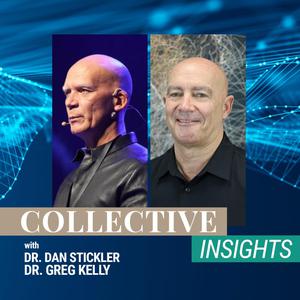 Collective Insights
Collective Insights
 The Stoa
The Stoa
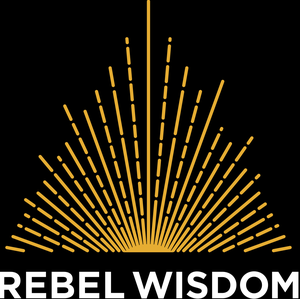 Rebel Wisdom
Rebel Wisdom
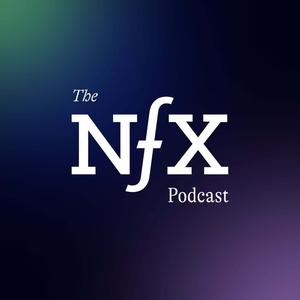 The NFX Podcast
The NFX Podcast
 The Jim Rutt Show
The Jim Rutt Show
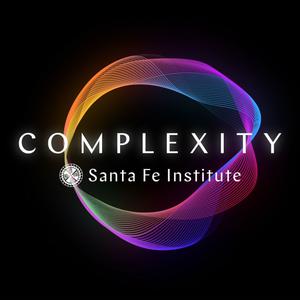 COMPLEXITY
COMPLEXITY